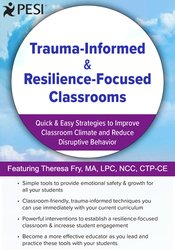Description
The new buzz in education is to be “trauma-informed.” The questions on all of our minds are: “How are we supposed to do this while meeting all of the other demands in education? How do I keep up with the curriculum while teaching my students these skills?” You may think “Let’s just add teaching kids how to behave to my already-impossible list of things to do.” Perhaps you’ve thought, “Here we go again…another excuse for kids to avoid consequences; schools care more about suspension rates than they do the sanity of their own teachers.”
Imagine adding strategies that take only a few minutes from your lesson plan and can benefit not only your entire class, but individual challenging students and, just as importantly, you as an educator? What if you could focus on teaching your curriculum while providing emotional safety and growth for ALL of your students instead of only one at a time? Imagine having a toolbox of strategies that you can use the next day without having to use your own money and time to find these activities.
Watch Theresa Fry in this recording and learn how a trauma-informed, resilience-focused approach will provide emotional safety & growth for all your students. By addressing their basic needs, you will increase their ability to self-regulate, decrease challenging behaviours, and simultaneously make your job notably easier. This positive approach will enable your students to learn to help themselves, leaving everyone feeling empowered, calm and ready to learn.
CPD
CPD
- PESI Australia, in collaboration with PESI in the USA, offers quality online continuing professional development events from the leaders in the field at a standard recognized by professional associations including psychology, social work, occupational therapy, alcohol and drug professionals, counselling and psychotherapy. On completion of the training, a Professional Development Certificate is issued after the individual has answered and submitted a quiz and course evaluation. This online program is worth 6.5 hours CPD for points calculation by your association.
Objectives
Upon completion of this seminar participants will be able to:
- Communicate the importance of emotional safety and relationships as it relates to students and the classroom.
- Explore the predictors of resilience using the brain science of trauma.
- Determine the zones of regulation and recommend strategies to empower individual students to use these on their own.
- Establish the difference between the in-class reset vs. the out-of-class reset and how consequences work in trauma-informed classrooms.
- Implement Mindfulness in the classroom in a quick, efficient, and effective way.
- Practice techniques to self-regulate & co-regulate.
- Explore the connection between the educator’s well-being and the student’s well-being and introduce strategies that work for both.
Outline
THE BRAIN SCIENCE OF TRAUMA AND RESILIENCE
- Trauma & the mind-body connection
- Brain development
- Polyvagal theory
- The science of resilience
BEHAVIOUR – SEPARATING THE DEED FROM THE DOER
- Reflection: the social discipline window & your approach to restoration
- History, tradition and the four basic needs
- Recognize if a student’s needs are distorted or absent
LET’S GET TO WORK: STRATEGIES, STRATEGIES & MORE STRATEGIES
Targeting strategies to reduce your most challenging classroom misbehaviours:
- Talking/blurting out
- Refusal
- Anger/rage
- Panic/anxiety reactions
- Lack of follow through
- Disrespect
- Student/student conflict
- Disengagement
Practical tools to meet students’ basic needs and promote resilience:
- Create emotional safety
- Build a relationship in difficult times
- Teach your students to accept feedback
- Address shame responses from students
Classroom wide interventions to improve self-regulation, promote compassion & create a supportive classroom climate
- Proactive strategies to build relationships
- Build a community and discuss expectations with circles
- Go slow to move fast: teach the skills that you want them to use
- Two ways to teach about the brain to develop a common vocabulary
- Zones of regulation for classroom management and self-regulation
- Brain breaks and sensory tools
- Mindfulness to help with transitions
Proven strategies to empower individual students
- Affective statements for informal conferences
- Whole classroom instruction on reset space, brain gym, and sensory tools
- Setting up your reset/calm space and how to use it
When to involve the student support team and next steps
- Universal Needs Assessment
- Private Logic
- Finding the appropriate interventions to meet specific needs
Target Audience
- General Educators
- Special Educators
- School Administrators
- Guidance Counselors
- Social Workers
- Behavior Interventionists
- School Psychologists
- Para-Professionals
- Directors of Special Education
- School Nurses
- School Physical Therapists
- Occupational Therapists
- Speech-Language Pathologists

